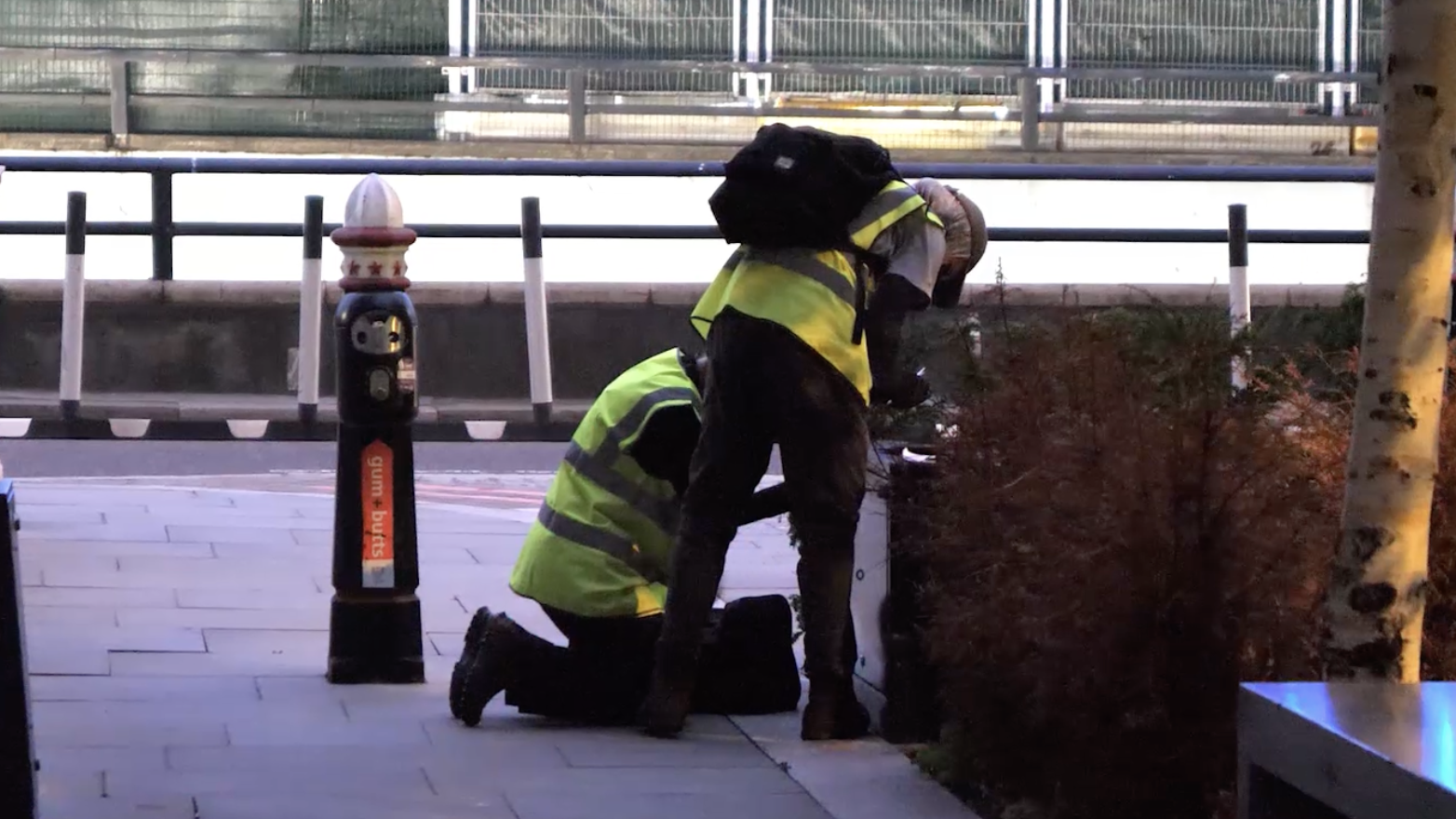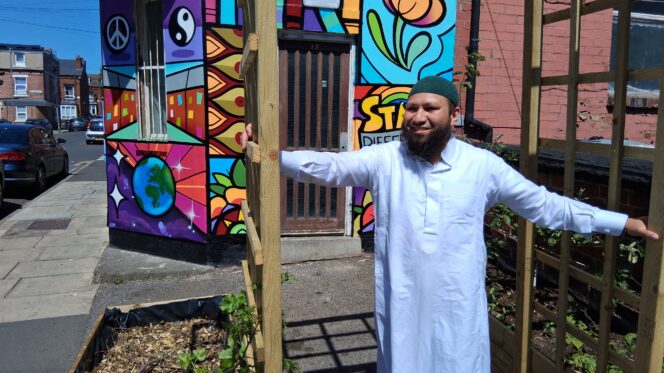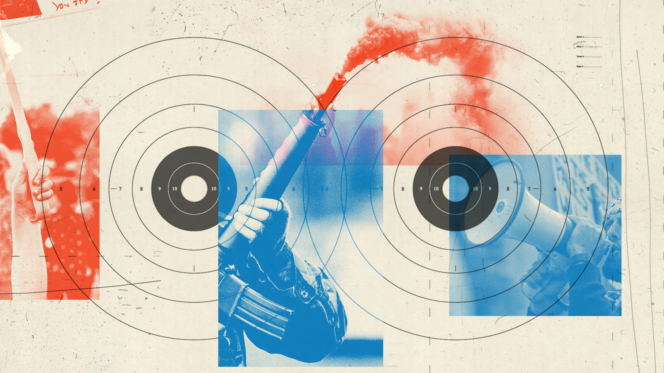Why Climate Activists Are Slashing JP Morgan’s Electricity Cables
‘Open organising is impossible.’
by Richard Hames
18 August 2025

It’s 5am. I’m standing at a bus stop near Liverpool Street Station in central London. I’m not here, unfortunately, to get an early morning flight from Stansted. Quite the opposite.
I’m here to see what the new radical flank of the climate movement is up to. Through an encrypted app I was told to download specially (Signal? Not secure enough), I’ve been given instructions to follow two activists in hi-vis at a distance. Who are they? I’m not told. Where are they going? I have no idea.
Apart from that, all I have is the name of the group – Shut the System – and a vague sense of paranoia that every passing person is a police officer in disguise.
By 6am, while the workers that clean and service the City are hopping off buses and as security staff are performing their night shift patrols, Shut the System activists have sliced the electricity cables that control the gas supply at JP Morgan’s London office and superglued the cabinet that houses them shut – making a quick repair impossible.
In short, an act of sabotage against the single largest fossil fuel funder in the world. Researchers say that over the last four years, JP Morgan has pumped an eye-watering $192 billion into the industry.
Simultaneously, another group cut the earthing cable in the electricity box outside the Allianz office in near Liverpool Street. Shut the System sent Allianz an email warning them of the risk of electrical damage they face without earthing. An Allianz spokesperson told Novara Media that despite activists’ efforts, the action did not cause any disruption at the site.
Despite Günther Thallinger, a top figure at the insurer, warning recently that climate change is on track to destroy capitalism, Allianz still insures $26 billion of fossil fuel projects, according to Investing in Climate Chaos’ reporting.
Shut the System argues that Allianz is also complicit in the Gaza genocide, as it is an insurer for Israeli weapons manufacturer Elbit Systems.
The actions on Monday weren’t limited to the capital. Up in Northampton, the group says activists also cut the 5G communications mast serving the Barclaycard headquarters. Barclays is Europe’s largest investor in fossil fuels, according to the same report.
This is the opening salvo of what it’s calling the “summer of sabotage” which will see “disruption like never before” against fossil fuel finance.
In the end, I have to take the groups’ word for all of it. Our high-security rendezvous turns out to be perhaps overly secure. I sit at the bus stop for half an hour, doing my best to look nonchalant, but no one turns up. The group later tells me this was down to a transport issue.
Why all the security? Unlike Just Stop Oil – where the plan was often to get arrested, in a dramatic display of commitment to the cause – Shut the System activists don’t intend on ever getting caught.
The caution is perhaps warranted. Although some of their sentences were marginally reduced on appeal (the most senior judge in the UK called them “manifestly excessive”), many Just Stop Oil protesters have been imprisoned for periods of several years. When the group “hung up their hi-vis” back in March, it was largely assumed that it had simply been policed out of existence.
Just Stop Oil would say otherwise. And, despite the harsh sentence for some, it might also point out that, when allowed to explain that its non-violent actions were designed to prevent climate breakdown, no small number of its activists had simply been acquitted by juries.
Instead, Just Stop Oil claimed victory. The then shiny-new Labour government announced that it would no longer tender new oil and gas licences – Just Stop Oil’s key demand. How flexible this will be remains to be seen, with possible work-arounds including expanding existing licences, and the ever-present possibility of a straight U-turn always looming.
But Just Stop Oil’s demand was simple and clear and, arguably, successful. Does Shut the System want anything so clear as Just Stop Oil?
Its demands are sourced not, as I had expected, from the fringes of radical environmentalist thought, but from the glossy Banking on Climate Chaos report, which documents the $7,900,000,000,000 (yes, that’s the right number of 000s) invested by the world’s 65 biggest banks in the fossil fuel industry.
Shut the System demands that “banks and insurance companies align their financing and underwriting practices with 1.5°C pathways and enable a fair and just transition”. This means that they:
- Exclude all finance for fossil fuel expansion immediately.
- Banks must adopt binding emissions reduction targets for all fossil fuels projects.
- Require robust, 1.5ºC-aligned transition plans from all existing fossil fuel clients.
- Protect human rights and the rights of indigenous peoples.
- Scale up financing for a just and fair energy transition.
Nothing about this would be out of place in a moderate NGO report on climate change. There’s a conspicuous lack of talk about degrowth or even anything particularly radical.
So what explains the gap between this relatively moderate set of demands and the intensity with which they are being pursued? Shut the System told me that after Just Stop Oil sprayed paint on private planes, “draconian policing laws made open organising impossible”.
The intensity is there not just in the tactics, but in the thinking too. Shut the System draws inspiration from a slew of groups from the history of climate direct action: “Earth First!, the ZAD in France, SHAC animal rights activists, NOTAV who sabotage machinery in Italy, German anti-coal sabotage, MOSOP protesters against Shell in the Niger Delta […] and activists who sabotaged the Dakota pipeline.” The group also looks to movements beyond the climate movement, from the Palestinians to the Kurdish liberation struggle.
The maxim of the climate movement has often been to think global and act local. The former is clearly embodied in this list. But perhaps nowhere in the world embodied the tension between the scale of the local and the global than the City of London.
How? The City of London is no ordinary place. Shut the System claims that “if the City of London alone was a country, it would be the world’s ninth biggest emitter – larger than Germany, Canada or Australia”. Not from especially leaky insulation in those tall buildings, but from the projects around the world its institutions facilitate.
Even so, banks and insurers might seem like a strange target. Why not go after the fossil fuel companies directly?
Insurers have become an increasingly popular target for direct actionists. Before it was proscribed as a terrorist group, Palestine Action also targeted Allianz. The idea is that companies that are more peripheral to the industry you’re attacking are also likely to be softer targets. Insurers can insure lots of things, and attacking them isn’t a threat to the whole of their business. Plenty of other things to insure.
Boycott Bloody Insurance, a campaign pressuring insurers it says are complicit in the Gaza genocide and the climate crisis, claims that when insurers ruled out backing Adani’s Carmichael coal mine in Australia and the notorious East African crude oil pipeline that moves through Uganda and Tanzania, it stalled these and similar controversial projects.
Without insurance, nothing can move. Putting pressure on insurance is, arguably, a way of leveraging the huge size and systemic complexity of modern capitalism against itself.
In these heady days, it’s not unreasonable to worry about Shut the System being proscribed, like Palestine Action recently was. It’s a way for the government to go after a group even if, like me, it has no idea who the members are.
Shut the System doesn’t seem too concerned. Not having targeted military bases, its activists think that’s a long way off for them. And it didn’t seem too fazed about public support for its actions either. Unlike many other groups, it isn’t actively looking for it.
Instead, it’s focused on its targets. And, it told me, those targets “should bear in mind that the longer they support genocide and climate collapse, the more people’s rage will build up against them.”
JP Morgan and Barclays have been approached for comment.
Richard Hames is an audio producer at Novara Media.


